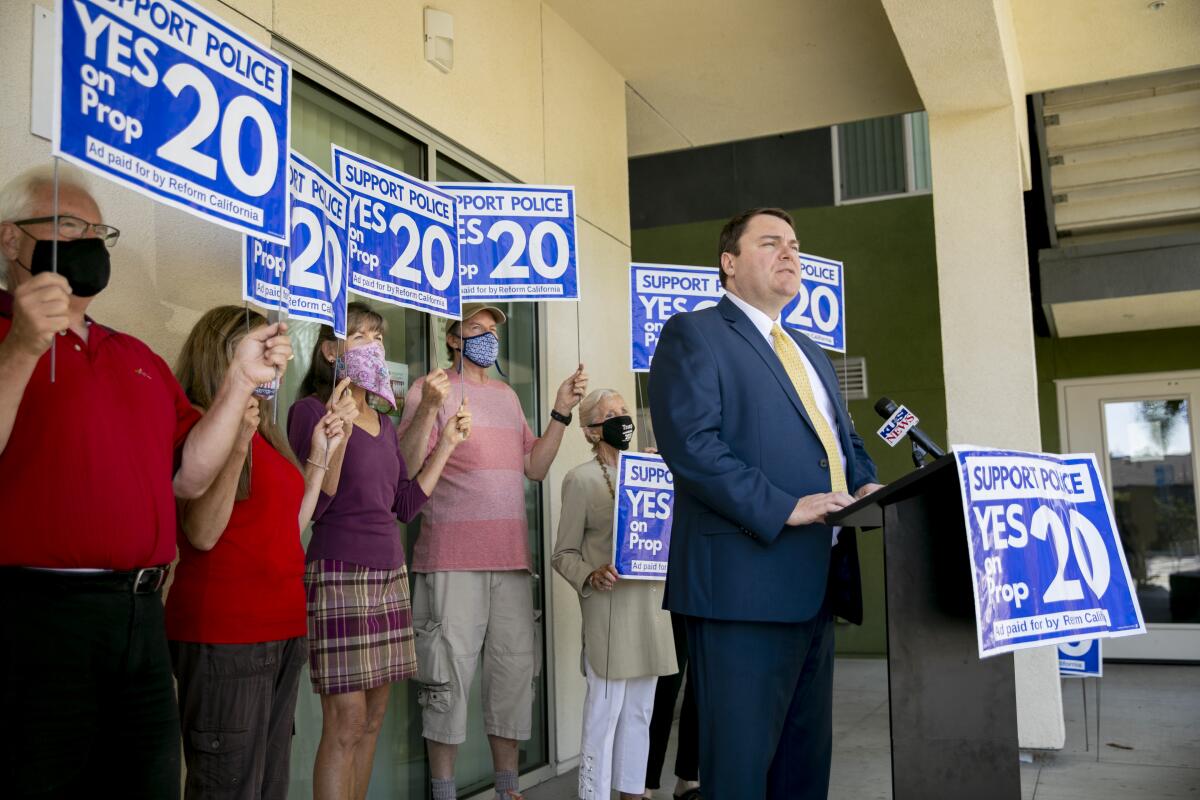How the Republican Party made gains in California but missed in San Diego County

- Share via
SAN DIEGO — Though not quite the resurgence they hoped for, California Republicans made significant gains around the state in this month’s election and are on pace to pick up three of the state’s 53 House seats, putting the party at 11.
San Diego County was not part of that trend.
Democrats flipped two San Diego City Council seats, comfortably staved off Republican challengers in two competitive Assembly districts and a competitive congressional district and claimed a majority on the San Diego County Board of Supervisors for possibly the first time.
In fact, the only real bright spots for San Diego Republicans may be that they reclaimed a majority on the Escondido City Council, and a Republican candidate held onto the 50th Congressional District — which was in play because its former occupant, Duncan Hunter, pleaded guilty to a felony related to misused campaign funds.
Casey Dominguez, professor of political science at the University of San Diego, said Republicans in the state had some solid wins but hit a wall in San Diego County.
“In Orange County, there are certainly some wins Republicans should be proud about,” she said. “But in general, what is going on in San Diego is what we’ve been seeing going on in urban counties across the country. There is a partisan polarization between people who live in cities and people who live farther out.”
Along with that polarization, local Republicans had to grapple with the “Trump factor.” President Trump remains broadly unpopular in California; only 33% of the state’s voters, and 37% of San Diegans, chose him over Joe Biden.
John J. Pitney Jr., professor of political science at Claremont McKenna College, said it will be easier for Republicans to redefine themselves once Trump is out of power. The president, he said, “took up all the oxygen,” leaving little room for creative policy.
“The question now is whether he’ll continue to lead the party while out of power, or will he go into exile in Mar-a-Lago,” Pitney said. “It’s difficult for new ideas to flourish in the shadow of Trump.”
Beyond that, San Diego Republicans have had to grapple with demographic changes as the region has become more diverse. Democrats in recent years have seized a significant advantage in voter registration — a departure from the dominance Republicans had in San Diego for decades.
From 1948 to 2004, a Republican presidential nominee carried San Diego County in every election. And in 1992, at the peak of the GOP’s power, Republicans had a nearly 120,000-person advantage over Democrats in county voter registration. Today, registered Democrats outnumber registered Republicans in the county by more than 240,000.
However, demographics don’t necessarily determine political destiny, election observers say.
“None of these shifts that we’ve seen in recent years should be seen as inevitable or permanent,” said Dominguez, noting that Republicans did well with Latino voters in some parts of the country during this election cycle.
Demographics “should be something that smart political parties look at in terms of their analysis and data and how can they reach out, build organizations, message better and find out what kind of work can they do to get the votes in the places they need votes,” she said.
Carl DeMaio, a conservative radio host and leader of the political action committee Reform California, made a similar point.
“Demographics mean the wind is at the back of the Democrats,” he said, “but it doesn’t mean you can’t understand demographics and meet people where they are.”
A former San Diego councilman and champion of the 2018 effort to repeal increases to the California gas tax, DeMaio blamed the recent GOP shortfalls on flawed strategy.
While praising the county’s Republican Party, he noted that Republicans statewide are at a fundraising disadvantage compared with Democrats. He said Republican candidates should put in the work of crafting grassroots campaigns and engaging in programs to better connect with voters in ways that go beyond television ads and direct mail.
Tony Krvaric, chairman of the Republican Party of San Diego County, declined to be interviewed for this story.
DeMaio also criticized some in the GOP for basing their campaign strategies on assumptions that voter turnout will be low.
“It’s a fatal mistake some Republicans have made in benchmarking the idea of winning elections when nobody shows up,” DeMaio said. “We need to base the strategy on overperforming when the odds are against you.”
He noted that Trump and some other Republicans performed well during the high-turnout 2020 election.
Pitney also noted that a low-turnout campaign approach would likely fail if voting by mail becomes the norm after this election cycle.
DeMaio said the party leaders and candidates need to recognize the importance of grassroots campaigning and should avoid putting forward candidates who run as “apologetic,” “wallflower” Republicans, afraid to offer bold ideas.

“What you saw play out in this election is soft-serve, vanilla ice cream, versus progressive candidates with bold flavors,” DeMaio said, adding that he doesn’t believe the progressive ideas will be good for residents.
“Republicans have been conditioned to run as apologetically Republican, and that’s not exciting to the base,” he said. “And it’s not going to persuade someone who is an independent or an open-minded voter to come your way.”
In the late 2000s and, especially, in 2010, the party was able to wrestle above its weight, he said, especially at the City Council level, when Republican candidates offered reforms that emphasized transparency in government, pension reform and taking on unions.
Candidates today need to focus on basic issues that transcend party labels, DeMaio added, such as cost of living and fixing roads.
Republican Darrell Issa, who represented San Diego in Congress for 18 years and will return to the House in January after winning the seat in the 50th District, said Republican candidates in San Diego have a model for success if they look north to the congressional victories of Young Kim and Michelle Steel in Orange County. Both flipped Democratic seats.
“Michelle and Young were both running as pro-growth, pro-economy Republicans, but they also were running as immigrant stories,” Issa said. “They were very proud of knowing where they came from and talking about how they knew where they wanted to go…. It was all about the life they built here.”

Issa pointed to another positive sign for California Republicans: The party is nearly back to where it was in congressional representation before 2018’s “blue wave.”
Closer to home, Issa is encouraged by the results of fellow Republican Brian Maryott’s campaign for the 49th Congressional District.
Maryott, a certified financial planner running in a district that includes northern San Diego and southern Orange counties, lost to first-term Rep. Mike Levin (D-San Juan Capistrano). Maryott on Friday trailed Levin by 6.4 percentage points, less than the 13-point defeat Republican Diane Harkey suffered against Levin in 2018.
“In a district that Trump lost and running against an incumbent, this says the district is not lost for a candidate like Maryott, who fits the district,” Issa said.
DeMaio said San Diego Republicans should be prepared to take advantage of a more favorable future in 2022, especially if Democrats struggle with control of the city, the county and Sacramento.
Pitney similarly noted that California is facing serious challenges. The COVID-19 pandemic overshadows everything, he said, and the state, county and cities will have major fiscal problems, with uncertainties about state revenue and pension obligations.
That could provide an opportunity for Republicans over the next several years, he added.
“With Democrats essentially in control of everything in Sacramento and everything locally, they are on the hook … if things go bad,” Pitney said. “Naturally, when times get tough, people get annoyed with the party in power.”
Clark writes for the San Diego Union-Tribune.
More to Read
Sign up for Essential California
The most important California stories and recommendations in your inbox every morning.
You may occasionally receive promotional content from the Los Angeles Times.














